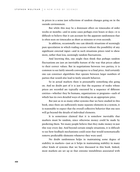in prices in a sense just reflections of random changes going on in the outside environment.
But while this may be a dominant effect on timescales of order weeks or months—and in some cases perhaps even hours or days—it is difficult to believe that it can account for the apparent randomness that is often seen on timescales as short as minutes or even seconds.
In addition, occasionally one can identify situations of seemingly pure speculation in which trading occurs without the possibility of any significant external input—and in such situations prices tend to show more, rather than less, seemingly random fluctuations.
And knowing this, one might then think that perhaps random fluctuations are just an inevitable feature of the way that prices adjust to their correct values. But in negotiations between two parties, it is common to see fairly smooth convergence to a final price. And certainly one can construct algorithms that operate between larger numbers of parties that would also lead to fairly smooth behavior.
So in actual markets there is presumably something else going on. And no doubt part of it is just that the sequence of trades whose prices are recorded are typically executed by a sequence of different entities—whether they be humans, organizations or programs—each of which has its own detailed ways of deciding on an appropriate price.
But just as in so many other systems that we have studied in this book, once there are sufficiently many separate elements in a system, it is reasonable to expect that the overall collective behavior that one sees will go beyond the details of individual elements.
It is sometimes claimed that it is somehow inevitable that markets must be random, since otherwise money could be made by predicting them. Yet many people believe that they make money in just this way every day. And beyond certain simple situations, it is difficult to see how feedback mechanisms could exist that would systematically remove predictable elements whenever they were used.
No doubt randomness helps in maintaining some degree of stability in markets—just as it helps in maintaining stability in many other kinds of systems that we have discussed in this book. Indeed, most markets are set up so that extreme instabilities associated with




